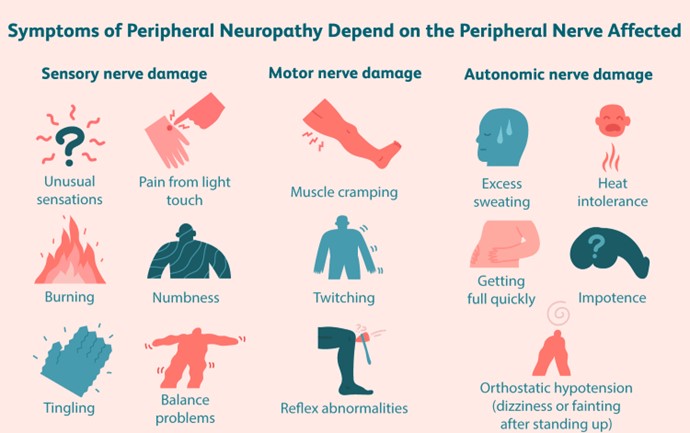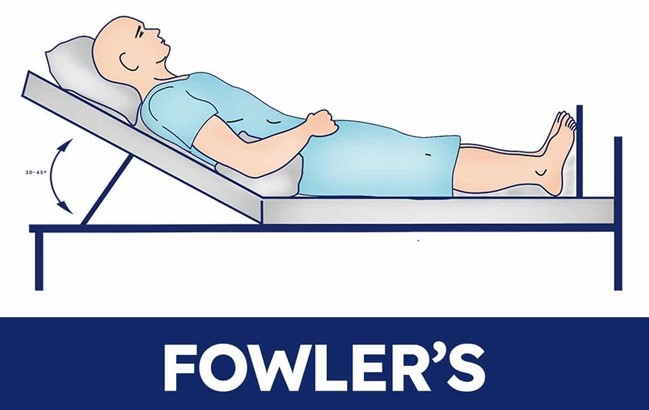A nurse is reinforcing teaching about preventing long-term complications of retinopathy and neuropathy with an older adult client who has diabetes mellitus. Which of the following actions is the most important for the nurse to include in the teaching?
“Wear closed-toed shoes daily.”
“Maintain stable blood glucose levels.”
“Plan to have an eye examination once per year.”
“Examine your feet carefully every day.”
The Correct Answer is B
Choice A reason: Wearing closed-toed shoes daily is a good practice for people with diabetes, as it can protect the feet from injuries and infections. However, it is not the most important action for preventing long-term complications of retinopathy and neuropathy. These complications are mainly caused by high blood glucose levels that damage the blood vessels and nerves in the eyes and feet.
Choice B reason: Maintaining stable blood glucose levels is the most important action for preventing long-term complications of retinopathy and neuropathy. High blood glucose levels can cause oxidative stress, inflammation, and endothelial dysfunction, which impair the blood flow and oxygen delivery to the eyes and feet. This can lead to nerve damage (neuropathy) and vision loss (retinopathy) over time. Keeping blood glucose levels within the target range can reduce the risk of these complications and slow down their progression if they already exist.
Choice C reason: Planning to have an eye examination once per year is a recommended action for people with diabetes, as it can help detect and treat retinopathy before it causes irreversible damage to the retina. However, it is not the most important action for preventing long-term complications of retinopathy and neuropathy. Eye examinations cannot prevent retinopathy from occurring or worsening; they can only monitor its status and provide appropriate interventions.
Choice D reason: Examining your feet carefully every day is another recommended action for people with diabetes, as it can help identify and treat any signs of neuropathy, such as numbness, tingling, pain, or ulcers. However, it is not the most important action for preventing long-term complications of retinopathy and neuropathy. Foot examinations cannot prevent neuropathy from occurring or worsening; they can only monitor its status and provide appropriate care.

Nursing Test Bank
Naxlex Comprehensive Predictor Exams
Related Questions
Correct Answer is A
Explanation
Choice A: Maintain the client in Fowler’s position. This is correct because Fowler’s position, which is a semi-sitting position with the head of the bed elevated 45 to 60 degrees, can facilitate the drainage of gastric contents and reduce the risk of aspiration.
Choice B: Use sterile water to irrigate the nasogastric tube. This is incorrect because sterile water is not necessary to irrigate the nasogastric tube, unless the client is immunocompromised or has a high risk of infection. Tap water or normal saline can be used to irrigate the nasogastric tube, following the provider’s orders or the facility’s protocol.
Choice C: Moisten the client’s lips with lemon-glycerin swabs. This is incorrect because lemon-glycerin swabs can dry out and irritate the client’s lips and oral mucosa, especially if used frequently. The nurse should use water-soluble lubricant or lip balm to moisturize the client’s lips and mouth.
Choice D: Measure abdominal girth daily. This is incorrect because measuring abdominal girth daily is not enough to monitor the progression of the intestinal obstruction and the effectiveness of the gastrointestinal decompression. The nurse should measure abdominal girth more frequently, such as every 4 hr or every shift, and report any changes or abnormalities.

Correct Answer is B
Explanation
Choice A: Provide bulk-forming agent. This is incorrect because bulk-forming agents are used to treat constipation, not bowel obstruction. They can worsen the obstruction by increasing the stool volume and pressure in the bowel.
Choice B: Elevate the head of the bed. Elevating the head of the bed is an important intervention for clients with a small bowel obstruction. It can help reduce abdominal pressure, promote comfort, and facilitate better respiratory function, especially if the client is experiencing any associated nausea or vomiting. This position can also aid in the proper positioning of the intestines, potentially helping with any non-complicated obstructions.
Choice D: Monitor intake and output every 8 hr. This is incorrect because monitoring intake and output is not enough to assess the fluid and electrolyte balance of a client with a bowel obstruction. The nurse should monitor intake and output more frequently, such as every 4 hr or every shift, and report any signs of dehydration or imbalance.
Choice C: Measure abdominal girth daily. While this is an important assessment for monitoring the status of the obstruction, the immediate intervention of elevating the head of the bed can provide immediate comfort and support during the acute phase of the obstruction.
Whether you are a student looking to ace your exams or a practicing nurse seeking to enhance your expertise , our nursing education contents will empower you with the confidence and competence to make a difference in the lives of patients and become a respected leader in the healthcare field.
Visit Naxlex, invest in your future and unlock endless possibilities with our unparalleled nursing education contents today
Report Wrong Answer on the Current Question
Do you disagree with the answer? If yes, what is your expected answer? Explain.
Kindly be descriptive with the issue you are facing.
